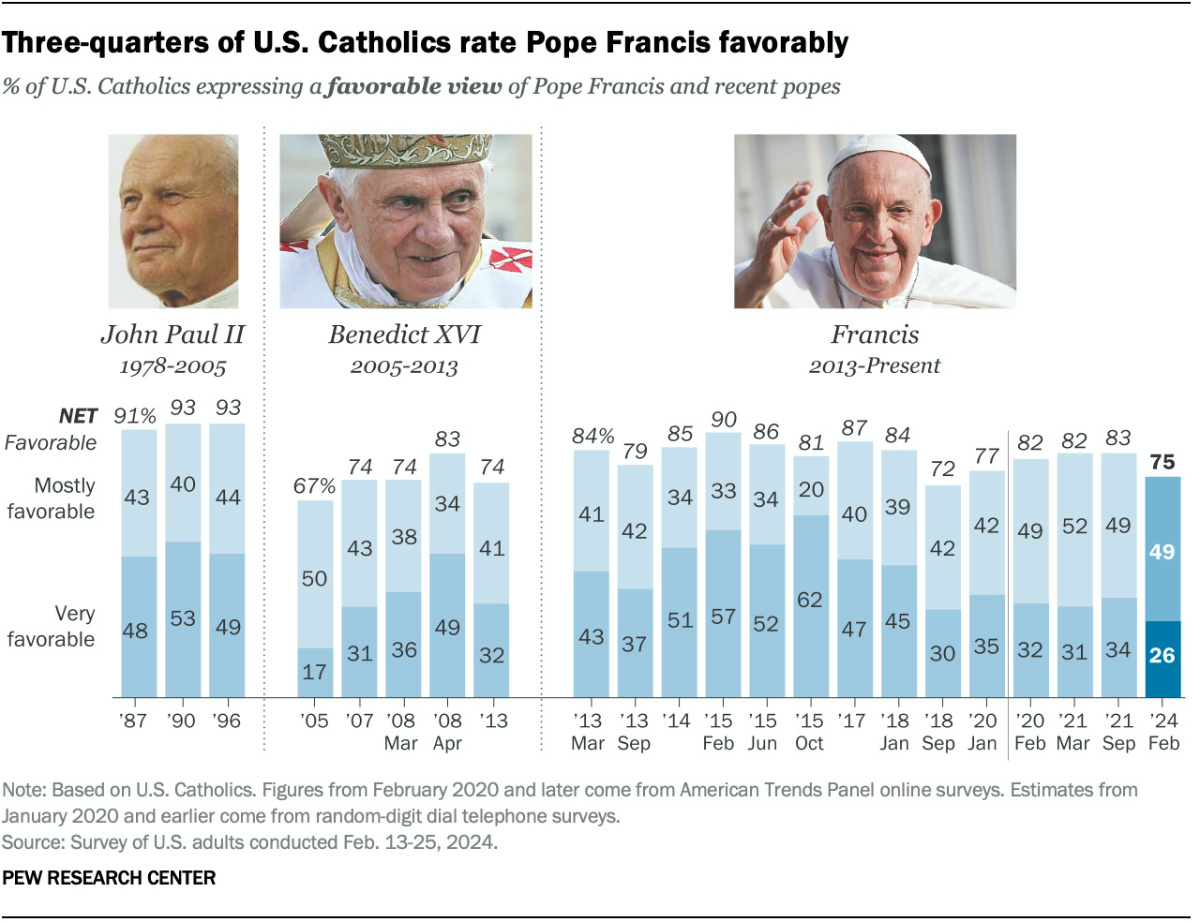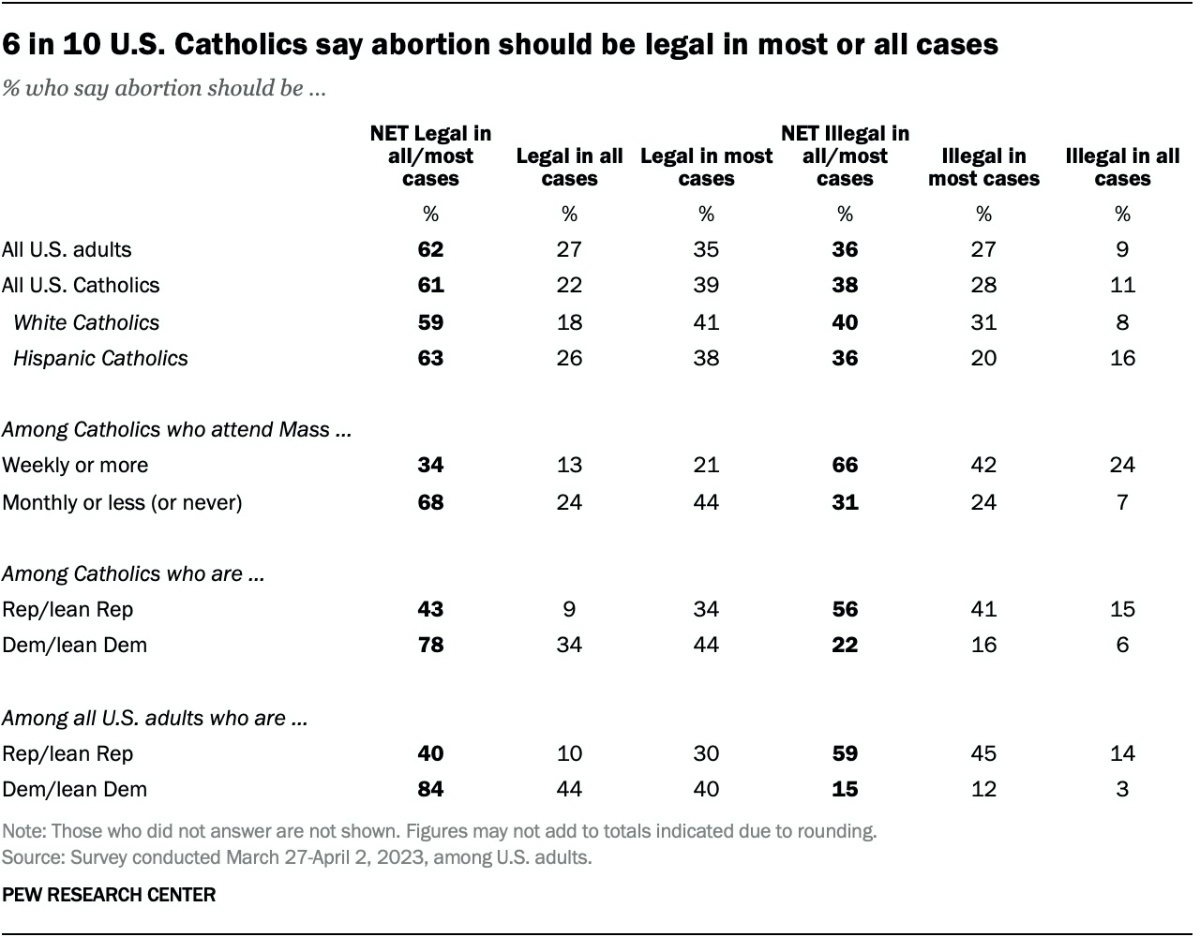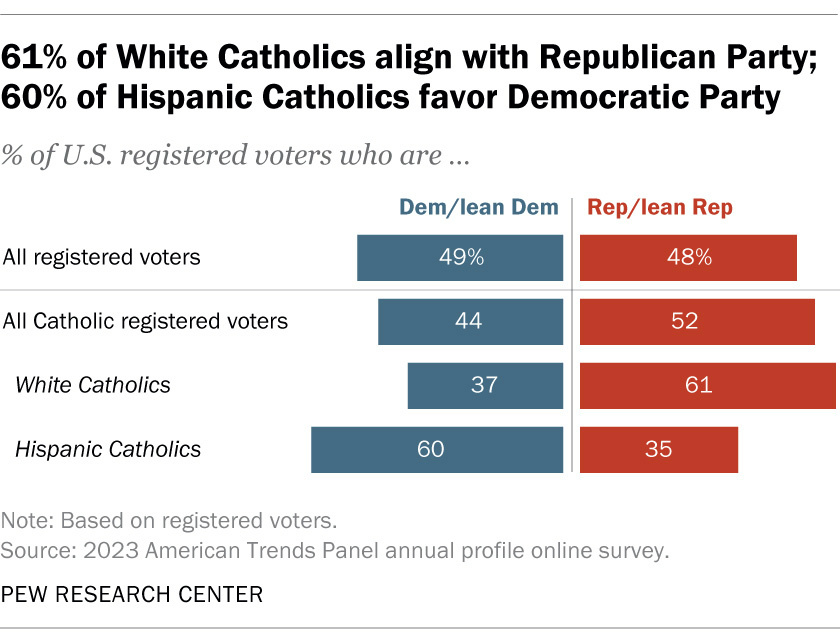United States
RNS
US Catholics are more polarised than ever in how they view Pope Francis, even though majorities on both ends of the political spectrum have a positive view of the Pope, according to a new survey.
Pew Research Center, in a report released on Friday, found that three-quarters of US Catholics (75 per cent) have a favourable view of Francis, with nearly nine in 10 Catholic Democrats and those who lean Democrat (89 per cent) expressing favorable views, and just under two-thirds of Catholic Republicans and those who lean Republican (63 per cent) saying the same.
 While the favourability rating from the Democratic camp was roughly in line with recent years, the Republican and Republican-leaning favourability rating represented a decline, creating the largest partisan gap in approval of Francis since his papacy began.
While the favourability rating from the Democratic camp was roughly in line with recent years, the Republican and Republican-leaning favourability rating represented a decline, creating the largest partisan gap in approval of Francis since his papacy began.
Of the 14 times Pew has asked about Francis’ popularity, the new survey records the pope’s second lowest favourability rate. The only time he received lower scores was in September, 2018 – a factor possibly influenced by the survey being taken right after Archbishop Carlo Maria Viganò alleged that he had warned Francis of Cardinal Theodore McCarrick’s sexually predatory behaviour and that Francis had ignored the warning.
Francis’ highest favorability rating reached 90 per cent in February, 2015, just months after he had confirmed he would be visiting the US during 2015.
According to the Pew survey, Catholics who view Francis unfavourably were more likely than Catholics who view him favourably to say he represents a major change in direction for the church, with just over half of Catholics who view Francis unfavourably (54 per cent) holding that view compared with four in 10 Catholics who view him favourably (41 per cent).
In the days before last October’s Synod of Bishops, Francis prayed the assembly would be a place where the Holy Spirit would “purify the church” from “polarisation”. The October assembly followed a multi-year global consultation of the Catholic faithful, a process that church reformers hoped and traditionalists feared would lead to sweeping changes in the church.
Last month, the Vatican announced that, instead of addressing controversial issues at the concluding assembly next October, study groups have been formed to address those issues, and they will finish their work by June 2025.
The Pew survey revealed that majorities of US Catholics supported church reform measures, although Catholics who attend Mass weekly or more supported these reforms at lower rates than Catholics who attend less frequently. Just over a quarter of US Catholics (28 per cent) said they attend Mass weekly.
More than eight in 10 US Catholics (83 per cent) expressed support for the church to allow birth control use, with 62 per cent of weekly Mass attenders saying the same. Three-quarters (75 per cent) expressed support for allowing unmarried Catholics who are living with a romantic partner to receive Communion, with 57 per cent of weekly Mass attenders agreeing.
In terms of reform to the priesthood, 69 per cent of adult US Catholics expressed support for allowing married priests, with a little more than half of weekly Mass attenders (53 per cent) saying the same. Nearly two-thirds of US Catholics (64 per cent) supported ordaining women priests, with 41 per cent of weekly Mass attenders saying the same.
As for recognising the marriages of gay and lesbian couples, more than half of US Catholics (54 per cent) expressed support, including a third of weekly Mass attenders (33 per cent).

Beyond the divides in responses based on Mass attendance, there were differences in support for church reform based on partisan affiliation, with Democrats and those leaning Democratic showing significantly higher support for church reform. While smaller majorities of Catholic Republicans and those leaning Republican supported all church reforms studied, the exception was in recognising the marriages of gay and lesbian couples, with only 36 per cent of Catholic Republicans expressing support.
The study also showed racial and ethnic differences in party affiliation among US Catholics. Six in 10 Hispanic Catholics (60 per cent) said they were aligned with the Democratic Party, while a similar percentage of white Catholics (61 per cent) said they were aligned with the Republican Party.
While majorities of white and Hispanic Catholics across age demographics supported every church reform surveyed, older Catholics (aged 50 and older) and white Catholics were more likely to support church reform measures than the younger cohort and than Hispanic Catholics – except when it came to recognising gay and lesbian marriages. On that question, Catholics aged 18 to 49 and Hispanic Catholics were slightly more supportive, with 56 per cent and 57 per cent supporting respectively compared to 53 per cent supporting among the age 50+ group and 52 per cent supporting among white Catholics.
The question on recognising the marriages of gay and lesbian couples also revealed a substantial gender gap – under half of Catholic men (47 per cent) supported recognising those marriages, while six in 10 Catholic women (60 per cent) expressed support.
Catholic men were a few points higher than Catholic women across most other church reform questions, except for on the question of allowing birth control, where 86 per cent of Catholic women expressed support compared with 79 per cent of Catholic men. Majorities of Catholic men and women supported every surveyed church reform, aside from the minority support among Catholic men for recognising the marriages of gay and lesbian couples.
We rely on our readers to fund Sight's work - become a financial supporter today!
For more information, head to our Subscriber's page.
On a question highly contested in US politics, the difference between weekly Mass attenders and all Catholics was also visible in support for legal abortion in all or most cases. While six in 10 US Catholics (61 per cent) said they supported legal abortion, only about a third of weekly Mass attenders (34 per cent) said the same.
There was also a substantial Catholic partisan divide in support for legal abortion, with Catholic Democrats supporting legal abortion at much higher rates. However, Catholic Democrats and those who lean Democratic were more likely to oppose legal abortion (22 per cent) than all US Democrats (15 per cent), while Catholic Republicans and those who lean Republican were slightly more likely to support legal abortion (43 per cent) than all US Republicans (40 per cent).
The differences between white and Hispanic Catholics on legal abortion views were narrower, with 63 per cent of Hispanic Catholics supporting legal abortion in all or most cases compared to 59 per cent of white Catholics. Pew did not report the views of Catholics of other racial and ethnic groups.

The Pew survey also reaffirmed previous research about the changing demographics of US Catholics, who represent 20 per cent of US adults. A third of US Catholics (33 per cent) are now Hispanic, a 4 percentage point increase since 2007. White non-Hispanic Catholics, who represent 57 per cent of US Catholics, have declined eight percentage points in the same time frame. Black non-Hispanic Catholics make up two per cent of the Catholic population and Asian non-Hispanic Catholics make up four per cent.
Hispanic Catholics are also younger on average than their white counterparts – only 43 per cent of Hispanic Catholics are 50 or older, compared with 68 per cent of white Catholics. Hispanic Catholics are the majority group in the western US, while white non-Hispanic Catholics make up the majority in the Northeast and the Midwest. In the South, 49 per cent of Catholics are white non-Hispanic and 40 per cent of Catholics are Hispanic.
White Catholics are much more likely to be college graduates than Hispanic Catholics. Four in 10 white Catholics (39 per cent) have a bachelor’s degree, while only 16 per cent of Hispanic Catholics do.
While roughly the same percentage of white and Hispanic Catholics said they attend Mass weekly, Hispanic Catholics were more likely to say religion is important in their lives (48 per cent) and that they pray daily (55 per cent), compared with white Catholics, where 44 per cent and 49 per cent agreed respectively.
The survey included 2,019 adult US Catholics and was fielded from 13th to 25th February. The margin of error is plus or minus 3.5 percentage points.






